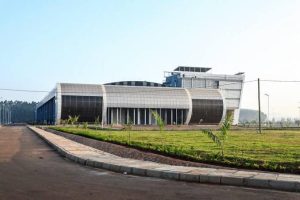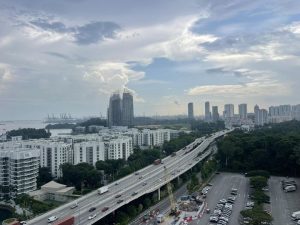
#OutToLunch: How Kikuubo can transition from trading to manufacturing
By Denis Jjuuko A few weeks ago, I was invited for a meeting in Jinja, which is about 80km away from Kampala. In order to make a small saving, I decided to drive with a friend who was also attending the same meeting. Our meeting was scheduled for 10.00am. We decided to leave Kampala at 7.00am in order to make it to Jinja in time. We thought that two hours were enough to cover the distance. Because my friend lives around Bweyogerere and it was early morning, we didn’t anticipate any difficulty in being in Jinja well ahead of the scheduled time. We decided to use the main Kampala-Jinja Road instead of the one through Kayunga that I normally prefer. Afterall, my anticipation was that we would be driving against traffic as the majority of people who live in Mukono would be coming into Kampala. The traffic was instead bumper to bumper in Namanve and Sseeta and we thought that once we go beyond Mukono town, we would be able to move faster. We continued our drive and along the way we started realizing that we could not make the trip by the scheduled time. We arrived in Jinja about 15 minutes late. I remembered this while watching clips from a meeting between the president and the traders who are protesting the tax system. The president advised them to become manufacturers instead of importers of finished products. If you are a regular reader of this column, you would know my position on manufacturing. I am an advocate because there aren’t many countries that developed without focusing on manufacturing. Through manufacturing, countries are able to employ large numbers of the working age population. Manufacturing ensures sustainable jobs with predictable regular income, a prerequisite for economic growth and wealth accumulation. When people have a regular predictable income, and not depending on chance, they can be able to invest in long term projects such as housing. Banks can offer low interest long term e.g., 30-year mortgages. Business people would invest in sectors for long-term knowing there are people who will be able to afford their products or services. When the majority of people’s incomes depend on prayer and the intercession of the holy spirit, investors keep away. The people can’t save. You can’t save what you don’t have. Banks, instead of lending money for business, they focus on lending to the government. They are nearly sure of being paid back than when they lend to businesses who don’t have an assured market. Anyway, if Uganda is to become a manufacturing hub as the president wants it to be, there are certain things that government must put in place. One of them is the highway not only to Jinja but to the Kenyan border. There are plans to build the Kampala-Jinja Expressway but they remain largely plans todate. If you are a regular user of the road beyond Jinja, you know that jam builds up between Kakira and Iganga (Kakira and Jinja is smooth because it is a four lane road). Maybe the Kampala Jinja Expressway should become Kampala-Iganga or even Malaba Expressway. If people are spending 3-4 hours to cover a distance of about 80km, like we did for the Jinja meeting, it will become costly for manufacturers as this is the main route for their raw materials and finished products (to the port of Mombasa). But even if the road was wide and smooth, road transport is expensive for manufacturers. Railway transport provides solutions but plans about the Standard Gauge Railway (SGR) became a mirage. Yet at one stage we had a railway line that almost connected all the major parts of the country. We also have Lake Victoria; it can solve some our bulky transport woes. The majority of Ugandan traders start after dropping out of primary or secondary school. They learn trading and after a few years of frugality and tenacity, they make it big. They will never invest in stuff that are not tangible such as research and development (R&D) which is key if any country is to become a hub. What most traders know is that if you pay this amount of money, you get this amount of goods and sell them at that amount of money. That is why EFRIS is a big issue yet maybe it shouldn’t. Government needs to appreciate their strengths and limitations and invest in R&D on their behalf, showing them which sectors or products, they can invest in as manufacturers and handhold them until when they can transition from informal traders to manufacturers. It can match them with foreign investors for joint ventures and most importantly for technology transfer and support them on issues such as corporate governance. There are already traders in Uganda who have made this transition, how did they make it? It is the story government should be telling while dangling the investment incentives traders need to make the transition. The writer is a communication and visibility consultant. djjuuko@gmail.com


